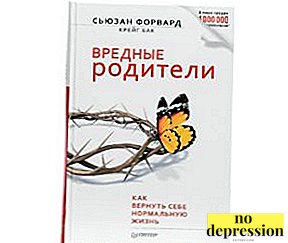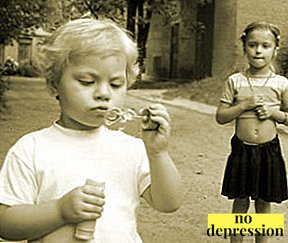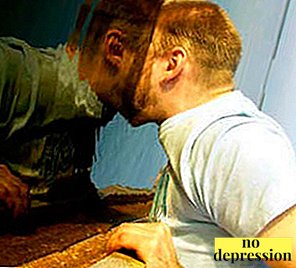Far from all parents can be called good, so their children, having matured, do not have much sympathy for them.
And if the parents behaved extremely badly with the children and continue to spoil their lives and in older adults, they may hate them.
Therefore, the answer to the question of why adult children hate their parents is quite simple: because they have good enough reasons in order to experience hatred.
Insult: Psychology and Causes

People of any age not required to have positive feelings to parents.
Any feelings experienced towards them are normal, and one should not try to set them as a non-norm, especially since for the emergence of every feeling, both positive and negative, reasons are needed.
Negative feelings for parents may have different expressions: from easy hostility to strong hatred.
At the same time, a negative feeling may not be permanent, but may appear from time to time, for example, in cases where another conflict has arisen between a parent and an adult child.
Acute hatred is usually observed in the following cases:
- When parents behaved toxicly for a long time. By toxicity can mean a variety of conditions. This and all sorts of violence (physical - beatings, pushes, slaps, food deprivation as a punishment ("today you can do without dinner"); psychological - gas-losing, refusal to provide medical care, invasion of personal space, up to the desire not to give the child the opportunity personal space to have, ridicule, humiliation, insults, a ban on hobbies, walking, talking to someone; sexual - rape, involvement in the provision of sexual services, sexual activities), and refusal to perform parental e responsibilities, ignoring the needs of children, and the desire to impose on the child unreasonable responsibility, to force him to fulfill all the whims.
 Details on what toxicity can be found in the book Toxic Parents, written by Susan Forward. An adult child who met good people, received care and love, fully realized that what was happening to him could be terrible, and he could begin to hate his parents very much and feel an acute resentment.
Details on what toxicity can be found in the book Toxic Parents, written by Susan Forward. An adult child who met good people, received care and love, fully realized that what was happening to him could be terrible, and he could begin to hate his parents very much and feel an acute resentment. - When something happened that dramatically changed the attitude of children to their parents. For example, one of the parents committed a serious crime. Or it turned out the truth about any of his actions. If the incident was serious and contrary to the moral principles that are present in children, they can turn away from the parent.
Also, hatred of one of the parents can occur in cases where he or she is extremely toxic to the spouse for a long time.
- When one or both parents, having learned some information about an adult child, began to behave toxicly. Reasons for changing attitudes can be mass. For example, parents learned the truth about the child’s sexual orientation, which he concealed. Either he lost his job, or chose an unsuitable partner in the opinion of his parents, a candidate, or changed his faith. If they begin to aggressively try to “fix” the child, this may cause him to hate or expressed dislike.

A strong negative reaction to parents can occur if a person begins to undergo treatment by a qualified psychotherapist, because in the course of treatment he will inevitably be forced to relive situations that caused him burning pain in childhood.
If treatment by a psychotherapist causes such reactions, this is a good sign that indicates that the therapy is working properly.
Sometimes hatred or dislike arises. to a good, responsible parent.
This usually happens when a person engages in a toxic romantic relationship and is not fully aware of this, and one or both parents notice and try to help.
In this case, a person may begin to get angry at them, because they speak badly about the beloved, who "is really not at all like that."
What problems arise?
The main problems with parents in adult children that can cause negative feelings (usually less intense than hate and dislike):
- Parents treat an adult child as a small one and interfere too much in their lives. This is most relevant in cases where the child’s family has been overseen too much. Mother and father, who did everything for him, made decisions for him and felt absolute power, face the circumstances in which he does not need them.
 Firstly, this leads to a crisis, parents feel that they have grown old, that most of their lives have passed, they feel fear, and secondly, they do not like that they have lost control. In some cases, parents do not even realize to the end that their children have entered an independent life and do not need an excessive amount of help. They impose, give inappropriate advice, get angry, condemn, put pressure on pity, blackmail, and the matured child begins to feel irritation and anger.
Firstly, this leads to a crisis, parents feel that they have grown old, that most of their lives have passed, they feel fear, and secondly, they do not like that they have lost control. In some cases, parents do not even realize to the end that their children have entered an independent life and do not need an excessive amount of help. They impose, give inappropriate advice, get angry, condemn, put pressure on pity, blackmail, and the matured child begins to feel irritation and anger. - The parent develops age-related pathologies that negatively affect his character and personality. Dyscirculatory encephalopathy, the consequences of a stroke and other vascular problems, depression, Alzheimer's disease, hypochondria can seriously change the personality of an elderly parent, make his decisions and behavior illogical, inadequate, complicate the interaction with him. Children caring for parents, it is important to remember about their diseases and how they affect the person.
Also, negative feelings may occur to parents who have serious pathological addiction (gambling, alcoholism, drug addiction).
Who is guilty?

In the appearance of chronic grievances in children parents are usually to blame, because these offenses begin to grow in early childhood due to abnormal and sometimes toxic behavior of the mother or father.
And to look for someone to blame for more recent conflicts is an empty affair.
It is more important for parents to realize that their children have grown up and learn keep a distance with themand children - have patience and understand how best to interact with parents.
Is it possible to build relationships?
Any person seeking to get out of a conflict situation and restore healthy relationships with someone is important to remember that make it unilaterally impossible.
It is necessary that all parties consciously strive to come to understanding and harmony.
Psychological tips for people with toxic parents:
- Increase the distance. If the severity of toxicity was really significant, turned your childhood into a painful nightmare, and parents never showed a desire to correct what happened, did not feel shame and remorse and continue to create discomfort, should not maintain close relations with them. The likelihood that one day they will treat you well is extremely low.
- Consult a psychotherapist. If toxicity is present in the parent-child relationship, the risk that mature children will carry complexes for decades and suffer from mental illness is very high. High-quality psychotherapeutic treatment will help you feel better and partially recover.

Psychological advice for people whose parents suffer from mental health conditions.:
- Try to understand the diagnoses of parents, if you notice that they behave strangely. If they have not been tested for a long time, you should convince them to do so. During attempts to convince, be polite and caring, give constructive arguments. Some older people may refuse to visit doctors because of the high cost of medications and examinations. Promise them that they will pay, and let them know that this will not be a problem. When you get your hands on information from doctors, try to learn more about diagnoses and what they can affect. For example, atherosclerosis and hypertension increase the risk of dyscirculatory encephalopathy.
Understanding that the behavior of parents is due to illness can help maintain patience.
- Try to bring as little negativity as possible into the life of parents and as much positive as possible. Enclose them from your problems, do not report on what they will unambiguously react with irritation and anger. Better give them as much warmth and care as possible. Give nice gifts, talk on abstract topics, walk together.
General recommendations for improving relationships with children:
- Use constructive dialogues. Talk about your inconvenience in a calm tone, avoid any aggression, but let us understand that the refusal to accept the conditions of the mother or father does not mean that you do not like them. When talking about your discomfort, do not use the accusatory language (“You spoil my mood,” “You are not behaving badly”), but put pressure on empathy (“When you did this, I was very upset”). In parallel, look for compromises, propose solutions.
- Ask questions. Ask to explain the behavior, ask what compromise will suit them, try to put yourself in their place. Show that you value them, show readiness to listen, and not just speak.
- Give positive emotions. Offer to attend events together, communicate on abstract topics, do interesting things together, come up with projects, avoid quarrels, scandals.
- Humble if you see that the desire to improve relations is one-sided. A conservative parent can be convinced that he is right, contrary to any efforts, and this will have to be accepted.
If there is no mutual desire to restore normal relations, nothing will be fixed. Try to keep your distance and help your parents as much as you can.

Recommendations to parents:
- Be open, fight conservative attitudes. The idea of “parent is always right” is controversial, and your task should be to find a solution and restore full-fledged communication, and not to prove one’s own right. Your child is no longer small and is able to manage his own life. Even if his decisions are wrong, in your opinion, he has the right to accept them. It is important for you to convey your opinion in a polite manner, to reason it and provide an opportunity to decide on your own.
- Communicate with your child on an equal footing. He is already an adult and wants to get an adult relationship that will allow him and you to find reasonable solutions. The times when you were more important and decided everything for him have passed, and you should recognize his right to control your own life.

Rebuilding healthy parent-child relationships can help. family psychologists.
How to forgive parents?
Psychological advice:
- Work on yourself and do not try to change parents. Their personalities have long been formed, and the likelihood that they will agree to change is low. But clumsy attempts to force them to change will become an additional reason for scandals.
Try to take care of yourself, visit a psychotherapist, avoid focusing on hatred, as this will increase resentment and will not improve mental well-being.
- Try to adopt parents. Remember about their shortcomings and look at them sensibly, take them into account when communicating and avoid situations in which you can become a victim.
- If circumstances allow, and dislike is not too strong, get close to them. Communicate, give each other warmth, take care of them, remember the bright moments. In this case, always keep a certain distance and remember that you have the right to those emotions that you experience. But if parental toxicity is too significant, it is better to give up close communication with them.
- Remember that it is impossible to change the past, but the present and the future are possible. Avoid digging into the past, try to think more about the present and how you can help yourself. Sensibly look at what happened, and realize that hate and resentment will not help your psyche.
- Turn on empathy and try to understand why parents behave this way. Imagine how you would feel if you were in their place. If the relationship with the father and mother is relatively established, ask them about how they feel.
Understanding why a person acts in one way or another always helps to accept it.

If relationships with parents are too hard, keep your distance and talk on neutral topics, support them as much as you can. If necessary, let them understand that your life belongs to you and you decide what to do with it.
Why do adult children move away from their parents? The psychologist will tell:

 Details on what toxicity can be found in the book Toxic Parents, written by Susan Forward. An adult child who met good people, received care and love, fully realized that what was happening to him could be terrible, and he could begin to hate his parents very much and feel an acute resentment.
Details on what toxicity can be found in the book Toxic Parents, written by Susan Forward. An adult child who met good people, received care and love, fully realized that what was happening to him could be terrible, and he could begin to hate his parents very much and feel an acute resentment. Firstly, this leads to a crisis, parents feel that they have grown old, that most of their lives have passed, they feel fear, and secondly, they do not like that they have lost control. In some cases, parents do not even realize to the end that their children have entered an independent life and do not need an excessive amount of help. They impose, give inappropriate advice, get angry, condemn, put pressure on pity, blackmail, and the matured child begins to feel irritation and anger.
Firstly, this leads to a crisis, parents feel that they have grown old, that most of their lives have passed, they feel fear, and secondly, they do not like that they have lost control. In some cases, parents do not even realize to the end that their children have entered an independent life and do not need an excessive amount of help. They impose, give inappropriate advice, get angry, condemn, put pressure on pity, blackmail, and the matured child begins to feel irritation and anger.

